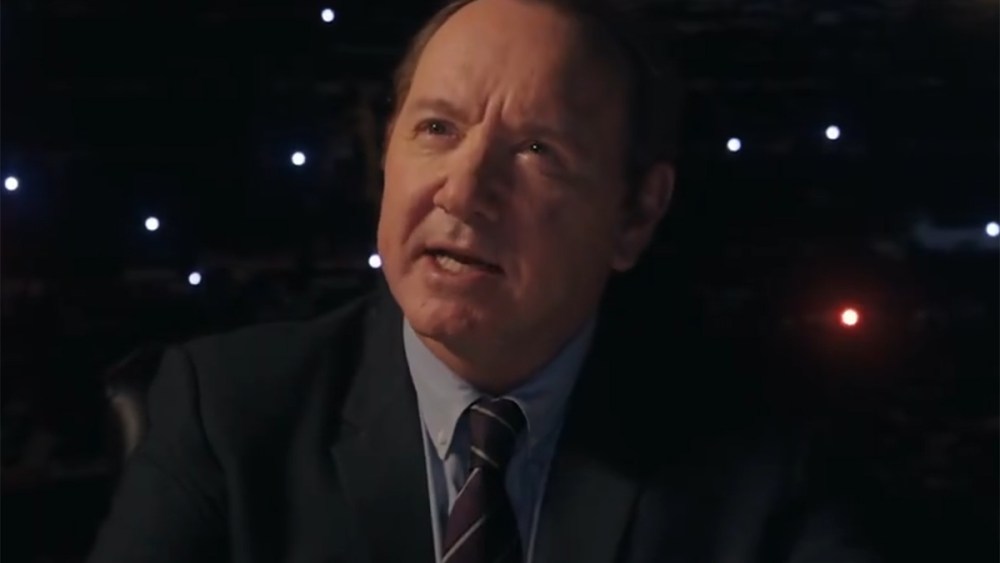
The Return of Frank Underwood: A Controversial Comeback
Kevin Spacey, the actor once celebrated for his portrayal of the ruthless Frank Underwood in Netflix’s hit series “House of Cards,” has reprised his iconic role in a promotional video for comedian Tim Dillon’s upcoming Netflix special, “I’m Your Mother.” This unexpected move has sparked a flurry of reactions, given Spacey’s history and the circumstances surrounding his departure from the streaming giant. The video features Spacey, fully embodying the Machiavellian Underwood, engaging in a darkly comedic exchange with Dillon, filled with veiled threats and sharp barbs, reminding audiences of the character’s signature brand of political maneuvering and moral ambiguity. This resurrection of Frank Underwood raises questions about the boundaries of art, redemption, and the complexities of public perception in the age of streaming content and social media.
The decision to bring back Frank Underwood, even in this limited capacity, is undoubtedly a calculated one. It’s a bold, perhaps even risky, move that aims to generate buzz and attract attention to Dillon’s comedy special. The shock value alone is undeniable. Spacey’s performance as Underwood was a defining moment in his career, and the character remains a compelling figure in the landscape of television anti-heroes. But the controversy surrounding Spacey’s personal life casts a long shadow, making this return a delicate balancing act. How will audiences react? Will they be able to separate the character from the actor, or will the association prove too problematic? Only time will tell if this gamble pays off for Dillon and Netflix.
The promo video itself is a masterclass in dark humor and unsettling charm. Spacey slips effortlessly back into the skin of Frank Underwood, delivering his lines with the same chilling precision and captivating intensity that made the character so memorable. The dialogue is sharp and witty, playing on themes of power, corruption, and the ever-blurring lines between reality and performance. The interaction between Underwood and Dillon is particularly engaging, with Dillon holding his own against Spacey’s formidable presence, adding another layer of intrigue to the promotional stunt. It leaves viewers wondering what the collaboration between these two enigmatic figures will bring.
Blackmail and the Internet Age: A Modern Twist
One of the most memorable moments in the promo video comes when Underwood attempts to blackmail Dillon, only to be outsmarted by the comedian’s embrace of internet culture. Underwood presents compromising photographs, expecting Dillon to crumble under the pressure. However, Dillon nonchalantly reveals that he has already posted the photos online, rendering the blackmail attempt futile. This clever twist highlights the changing dynamics of power in the digital age. Blackmail, once a potent weapon, loses its sting in a world where privacy is increasingly illusory and personal information is readily shared. Dillon’s response is a commentary on the desensitization of the public eye and the fleeting nature of scandal in an era of constant information overload.
This exchange also underscores the central themes of Dillon’s comedy, which often tackles the absurdities and contradictions of modern life. By turning the tables on Underwood’s blackmail attempt, Dillon subverts the traditional power dynamic and exposes the hollowness of Underwood’s manipulative tactics. It’s a moment of triumph for the underdog, a testament to the resilience and adaptability of individuals in the face of overwhelming forces. The scene is both humorous and thought-provoking, prompting viewers to question their own relationship with technology, privacy, and the ever-shifting landscape of social norms. What was once a shield is now easily transformed into a weapon, or in Dillon’s case, another piece of content.
Furthermore, the scene is a brilliant commentary on the nature of content creation in the digital age. As Dillon points out, “We don’t have blackmail. We have content.” This line encapsulates the commodification of personal information and the insatiable appetite for spectacle that drives much of online culture. In a world where every moment can be captured and shared, the line between private and public blurs, and the concept of shame becomes increasingly irrelevant. Dillon’s embrace of this reality is both cynical and empowering, suggesting that in the age of the internet, the only way to survive is to embrace the chaos and turn every experience into a source of entertainment.
“I’m as Dead as John McCain”: A Risky Joke?
Spacey’s quip, “I’m as dead as John McCain,” is arguably the most controversial line in the promo video. The joke, referencing the late senator’s passing, has been met with mixed reactions, with some finding it distasteful and disrespectful. Given the sensitive nature of death and the political divides surrounding McCain’s legacy, the line is undoubtedly provocative. It raises questions about the limits of comedy and the responsibility of performers to be mindful of their audience’s sensibilities. Was the joke intended to be edgy and attention-grabbing, or did it cross the line into insensitive territory? The answer to this question likely depends on individual perspectives and interpretations.
However, it is important to consider the context in which the joke is delivered. Spacey is playing a fictional character, Frank Underwood, who is known for his ruthless and amoral behavior. The line is consistent with Underwood’s persona, reflecting his willingness to say and do anything to achieve his goals. In this sense, the joke can be seen as a commentary on the character’s lack of empathy and his disregard for social norms. It is a reminder that Underwood is not meant to be a likable or admirable figure, but rather a cautionary tale about the corrupting influence of power.
Moreover, the joke can be interpreted as a form of dark humor, a genre that often uses taboo subjects to provoke thought and challenge conventional wisdom. Dark humor is not for everyone, and it is often met with controversy. However, it can be a powerful tool for exploring difficult and uncomfortable topics, forcing audiences to confront their own biases and assumptions. In this case, the joke about John McCain can be seen as a way of satirizing the political landscape and the often-cynical nature of American politics. Whether it succeeds in this aim is a matter of debate, but it is important to recognize the potential for deeper meaning beneath the surface of the seemingly insensitive remark.
From “House of Cards” to Comedy Special: A New Chapter?
The collaboration between Kevin Spacey and Tim Dillon is a fascinating and unexpected pairing. Spacey, a seasoned actor with a long and distinguished career, is known for his dramatic roles. Dillon, on the other hand, is a rising star in the world of comedy, known for his provocative and often controversial humor. What brought these two figures together? What do they hope to achieve with this collaboration? The answer to these questions remains to be seen, but it is clear that both Spacey and Dillon are seeking to push boundaries and challenge expectations.
For Spacey, this collaboration may represent an attempt to rehabilitate his image and return to the spotlight after a period of controversy and public scrutiny. By embracing a comedic role, he may be hoping to show a different side of himself and win back the support of audiences. It is a risky strategy, but it could potentially pay off if he is able to demonstrate humility and a willingness to learn from his past mistakes. Ultimately, only time will tell if Spacey is able to successfully navigate this new chapter in his career.
Ultimately, the return of Kevin Spacey as Frank Underwood is a complex and multifaceted event. It raises questions about art, morality, redemption, and the ever-changing landscape of the entertainment industry. Whether you find it humorous, offensive, or simply intriguing, there is no denying that it is a moment that will be remembered and debated for years to come.
The Lasting Impact and Controversy
The promotional stunt, while generating significant attention for Tim Dillon’s Netflix special, also serves as a stark reminder of the complexities surrounding Kevin Spacey’s legacy. The actor, once at the pinnacle of Hollywood success, now navigates a career shadowed by serious allegations. This re-emergence as Frank Underwood forces a re-evaluation of how we consume media and the ethical considerations of supporting projects involving individuals with controversial pasts. While some may view it as a clever marketing ploy, others find it insensitive, questioning the decision to provide a platform, even in a limited capacity, to someone facing such accusations. The debate highlights the ongoing tension between artistic expression and social responsibility, leaving audiences to grapple with their own moral compasses.



